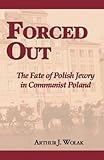|
|
Help |
| Home - Basic P - Poland Government (Books) | |
e99 Online Shopping Mall
|
|
Help |
| Home - Basic P - Poland Government (Books) | |
| Back | 81-100 of 100 |
click price to see details click image to enlarge click link to go to the store
| 81. Reinventing Poland: Economic and Political Transformation and Evolving National Identity (BASEES/Routledge Series on Russian and East European Studies) | |
 | Hardcover: 288
Pages
(2008-04-03)
list price: US$170.00 -- used & new: US$145.47 (price subject to change: see help) Asin: 0415451752 Canada | United Kingdom | Germany | France | Japan |
|
Editorial Review Product Description | |
| 82. Scepter of Judah: The Jewish Autonomy in the Eighteenth-Century Crown Poland (Studia Judaeoslavica) by Judith Kalik | |
 | Hardcover: 404
Pages
(2009-09-15)
list price: US$179.00 -- used & new: US$149.97 (price subject to change: see help) Asin: 9004166017 Canada | United Kingdom | Germany | France | Japan |
| 83. Forced Out: The Fate of Polish Jewry in Communist Poland by Arthur J. Wolak | |
 | Paperback: 220
Pages
(2004-05-31)
list price: US$17.95 -- used & new: US$11.27 (price subject to change: see help) Asin: 1587362910 Average Customer Review: Canada | United Kingdom | Germany | France | Japan |
|
Editorial Review Product Description Surveying the Jewish experience in Poland from the reign of Poland's kings to the present day, Forced Out details this important yet little-known era in Poland, a nation that has since broken through the Iron Curtain to emerge as one of the West's staunchest allies as a member of NATO and the European Union. Customer Reviews (5)
| |
| 84. The Failure of Authoritarian Change: Reform, Opposition and Geo-Politics in Poland in the 1980's by Andre W. M. Gerrits | |
| Hardcover: 270
Pages
(1990-12)
list price: US$130.00 -- used & new: US$83.01 (price subject to change: see help) Asin: 1855211335 Canada | United Kingdom | Germany | France | Japan | |
| 85. Poland, 1981: Towards Social Renewal by Peter K. Raina | |
| Hardcover: 480
Pages
(1985-07)
list price: US$44.95 Isbn: 0043350526 Canada | United Kingdom | Germany | France | Japan | |
| 86. The Generation: The Rise and Fall of the Jewish Communists of Poland (Societies and Culture in East-Central Europe, No 5) by Jaff Schatz | |
 | Hardcover: 426
Pages
(1991-06-25)
list price: US$50.00 -- used & new: US$55.20 (price subject to change: see help) Asin: 0520071360 Average Customer Review: Canada | United Kingdom | Germany | France | Japan |
|
Editorial Review Product Description Customer Reviews (2)
| |
| 87. Haskalah and Hasidism in the Kingdom of Poland: History of a Conflict by Marcin Wodzinski | |
 | Hardcover: 335
Pages
(2005-08)
list price: US$59.50 -- used & new: US$42.00 (price subject to change: see help) Asin: 1904113087 Canada | United Kingdom | Germany | France | Japan |
|
Editorial Review Product Description | |
| 88. Political Authority and Party Secretaries in Poland, 1975-1986 (Cambridge Russian, Soviet and Post-Soviet Studies) by Paul G. Lewis | |
 | Paperback: 368
Pages
(2009-11-12)
list price: US$48.00 -- used & new: US$41.04 (price subject to change: see help) Asin: 0521122864 Canada | United Kingdom | Germany | France | Japan |
|
Editorial Review Product Description | |
| 89. The Orchestration of the Media: The Politics of Mass Communications in Communist Poland and the Aftermath (International Communication and Popular C) by Tomasz Goban-Klas | |
| Hardcover: 289
Pages
(1994-08)
list price: US$67.00 -- used & new: US$263.86 (price subject to change: see help) Asin: 0813318688 Canada | United Kingdom | Germany | France | Japan | |
|
Editorial Review Product Description | |
| 90. Poland from the inside by Bertram De Colonna | |
 | Hardcover: 167
Pages
(1939)
Asin: B00087Q52W Canada | United Kingdom | Germany | France | Japan |
| 91. Poland and European Integration: The Ideas and Movements of Polish Exiles in the West, 1939-91 by Thomas Lane, Marian Wolanski | |
 | Hardcover: 344
Pages
(2009-08-15)
list price: US$89.95 -- used & new: US$74.95 (price subject to change: see help) Asin: 0230229379 Canada | United Kingdom | Germany | France | Japan |
|
Editorial Review Product Description | |
| 92. The Road to Gdansk: Poland and the U. S. S. R. by Daniel Singer | |
| Paperback: 256
Pages
(1982-02-01)
list price: US$10.00 -- used & new: US$10.00 (price subject to change: see help) Asin: 0853455686 Canada | United Kingdom | Germany | France | Japan | |
| 93. Poland: Complying With Eu Environmental Legislation (World Bank Technical Paper) by Gordon Hughes, Julia Bucknall | |
 | Paperback: 52
Pages
(1999-10)
list price: US$22.00 -- used & new: US$19.75 (price subject to change: see help) Asin: 0821345958 Canada | United Kingdom | Germany | France | Japan |
| 94. For Our Freedom and Yours: The Jewish Labour Bund in Poland, 1939-1949 (Parkes-Wiener Series on Jewish Studies) by Daniel Blatman | |
 | Hardcover: 242
Pages
(2003-05)
list price: US$69.95 -- used & new: US$13.20 (price subject to change: see help) Asin: 0853034494 Canada | United Kingdom | Germany | France | Japan |
| 95. Germans, Poland, and Colonial Expansion to the East: 1850 Through the Present (Studies in European Culture and History) | |
 | Hardcover: 212
Pages
(2009-01-15)
list price: US$85.00 -- used & new: US$48.95 (price subject to change: see help) Asin: 0230612687 Canada | United Kingdom | Germany | France | Japan |
|
Editorial Review Product Description This incisive collection probes the history of colonialism within Europe and posits that Eastern Europe was in fact Germany’s true “colonial” empire. Through a series of interdisciplinary essays ranging from 1850 to the European Union of today, this collection explores the idea that Germany’s relationship with Poland and Eastern Europe had many similarities to the practice of “overseas” colonialism. As the contributing scholars aptly demonstrate, the history of Germany’s relationship with Poland contains all the trappings of the classic colonial encounter, from its structures of power and control, racism and cultural chauvinism, to the implementation of wholesale scientific experimentation in a “lawless” environment. | |
| 96. Political Ideas in Contemporary Poland by Jan Zielonka | |
| Hardcover: 210
Pages
(1989-04)
list price: US$99.95 -- used & new: US$88.16 (price subject to change: see help) Asin: 056607012X Canada | United Kingdom | Germany | France | Japan | |
| 97. The Clash of Moral Nations: Cultural Politics in Pilsudski's Poland, 1926-1935 (Polish and Polish American Studies) by Eva Plach | |
 | Hardcover: 272
Pages
(2006-11-01)
list price: US$42.95 -- used & new: US$7.34 (price subject to change: see help) Asin: 0821416952 Canada | United Kingdom | Germany | France | Japan |
|
Editorial Review Product Description | |
| 98. Marketization and Poland's Transfer Payments.: An article from: International Advances in Economic Research by Bozena Leven | |
| Digital: 12
Pages
(2000-05-01)
list price: US$5.95 -- used & new: US$5.95 (price subject to change: see help) Asin: B0008HCU2Q Canada | United Kingdom | Germany | France | Japan | |
|
Editorial Review Product Description | |
| 99. Combating Conflict of Interest in the Cee Countries (Local Government Policy Partnership) by Barbara Kudrycka | |
| Paperback: 344
Pages
(2004-01)
list price: US$24.95 -- used & new: US$24.95 (price subject to change: see help) Asin: 9639419508 Canada | United Kingdom | Germany | France | Japan | |
|
Editorial Review Product Description | |
| 100. Balancing National and Local Responsibilities: Education Management and Finance in Four Central European Countries (Local Government Policy Partnership) by Kenneth Davey | |
| Paperback: 365
Pages
(2003-02)
list price: US$25.00 -- used & new: US$33.03 (price subject to change: see help) Asin: 963941932X Canada | United Kingdom | Germany | France | Japan | |
|
Editorial Review Product Description | |
| Back | 81-100 of 100 |